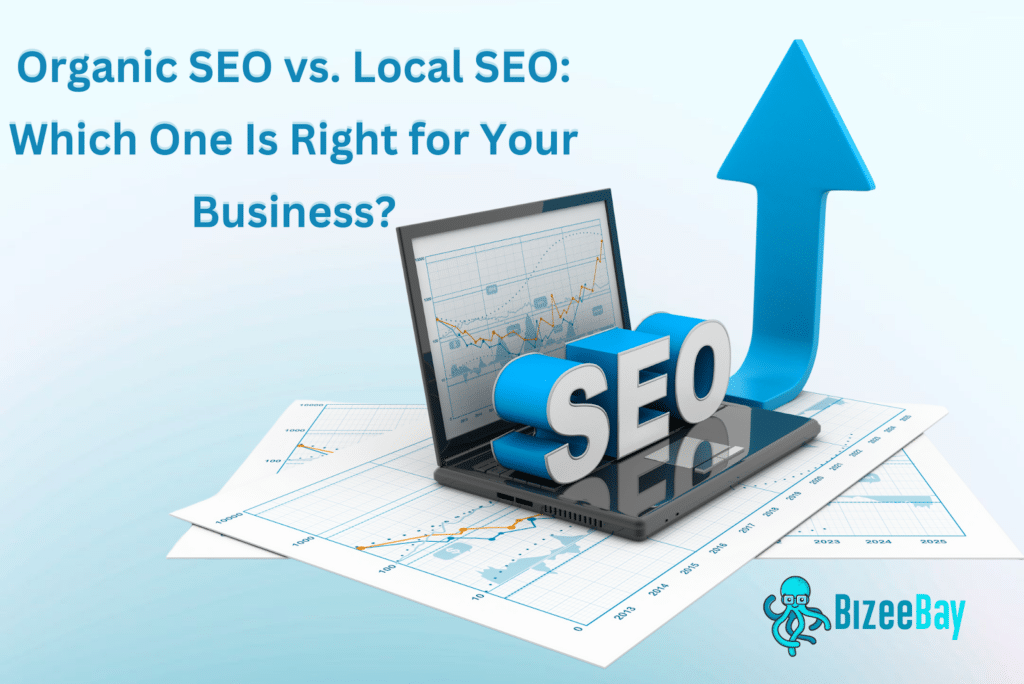Businesses must focus on getting noticed online. With the power of SEO (Search Engine Optimization), a well-crafted strategy can drive traffic, improve visibility, and, ultimately, boost sales. But with different types of SEO available, knowing which one to invest in can be challenging. Should you focus on Organic SEO or Local SEO?
At BizeeBay, we understand the unique challenges that businesses face when it comes to choosing the right SEO approach. This guide will help you distinguish between Organic SEO and Local SEO and determine which option is best for your business.
What is Organic SEO?
Organic SEO is a strategy focused on improving a website’s rankings on search engines like Google, targeting a broader audience without geographical limitations. This approach is ideal for businesses that want to grow their visibility nationwide or even globally.
Key Elements of Organic SEO
- High-Quality Content Creation: Content should be informative, engaging, and optimized with relevant keywords.
- Keyword Optimization: Using the right keywords strategically throughout your website is essential for organic visibility.
- Link Building: Backlinks from reputable websites build authority and improve rankings.
- Website Optimization: Technical aspects like site speed, mobile responsiveness, and user-friendly navigation enhance the user experience.
- User Experience (UX): The website’s design and performance should keep users engaged and make information accessible.
How BizeeBay Helps
BizeeBay’s Organic SEO solutions are tailored to help businesses achieve long-term growth by building a strong online presence. We focus on creating valuable content, optimizing for high-volume keywords, and ensuring your site meets the latest technical standards.
What is Local SEO?
Local SEO targets a geographically specific audience, often through searches such as “near me” queries or city-specific keywords. This type of SEO is ideal for businesses with physical locations or service areas, as it helps them connect with local customers who are actively searching for relevant products or services.
Key Elements of Local SEO
- Google My Business (GMB) Optimization: Your GMB profile is crucial for local searches, providing details like business hours, contact info, and customer reviews.
- Local Citations and Directories: Listing your business in local directories like Yelp and Yellow Pages increases visibility.
- Localized Content: Content with location-specific keywords helps attract nearby customers.
- Customer Reviews: Positive reviews build trust and improve rankings in local searches.
- Proximity, Relevance, and Prominence: Google considers these factors when determining local search rankings.
How BizeeBay Supports Local SEO
At BizeeBay, we specialize in local SEO strategies that help businesses rank in local searches. From optimizing Google My Business profiles to generating local citations, we provide comprehensive support for businesses looking to grow locally.
Comparing Organic SEO and Local SEO: Which is Better for Your Business?
To help decide between Organic SEO and Local SEO, let’s examine some key factors:
1. Target Audience
| Organic SEO | Local SEO |
| Focuses on reaching a broad, national or global audience. | Targets a specific geographic area for customers nearby. |
| Ideal for e-commerce, online services, or businesses with national reach | Best suited for physical locations or service-based businesses. |
2. Cost and Investment
| Organic SEO | Local SEO |
| Organic SEO often requires a higher upfront investment due to its broader reach, it yields long-term results with less ongoing maintenance. | Typically more affordable, Local SEO offers faster results for businesses seeking visibility in a particular area. |
3. Speed of Results
| Organic SEO | Local SEO |
| Organic results take time, typically showing impact over several months. Once established, however, they remain stable with regular updates. | Local SEO can produce quicker results due to the smaller target area, especially when local directories and GMB profiles are well-managed. |
4. Which Type of Business Benefits More?
Certain business types benefit more from one approach than the other. Below is a chart showing which SEO strategy might be most effective:
| Business Type | Recommended SEO Focus |
| E-commerce Stores | Organic SEO |
| National Brands | Organic SEO |
| Local Restaurants | Local SEO |
| Service-based Businesses | Local SEO |
| Freelancers | Both |
When to Choose Organic SEO Over Local SEO (and Vice Versa)
| Choose Organic SEO | Choose Local SEO |
| If your business operates nationally or doesn’t rely on local customers (e.g., online retail or SaaS). | If your business serves a specific community or geographical area (e.g., coffee shops, plumbers). |
Combining Organic and Local SEO can also be effective for businesses that need both local and national visibility. BizeeBay can help create a unified strategy that meets both goals, driving traffic on a broader scale and attracting local customers.
How BizeeBay Supports Both Organic and Local SEO
At BizeeBay, we offer customized approaches to meet each business’s needs, whether through Organic or Local SEO. Our team combines industry expertise and advanced tools to drive results. Here’s how we help:
- Comprehensive SEO Audits: We analyze your website and identify areas for improvement, ensuring both on-page and off-page optimization.
- Customized Keyword Strategies: Our keyword research is specific to your goals, whether it’s high-volume keywords for Organic SEO or location-based keywords for Local SEO.
- Content Creation: We develop engaging, high-quality content that resonates with your audience and boosts SEO rankings.
- Local Listings and GMB Optimization: For Local SEO, we ensure your business is accurately represented across all local directories and Google My Business.
With BizeeBay, you’ll receive a solution that’s designed to drive both short-term gains and long-term growth.
SEO Strategies: Common Overlaps and Differences
While Organic SEO and Local SEO have distinct focuses, some strategies overlap. Here’s how each approach uses SEO techniques:
- Keyword Research: Organic SEO keywords are often broad, targeting industry terms, while Local SEO keywords are location-specific.
- On-Page Optimization: Both require optimized metadata, headers, and images, but Local SEO will also include city or neighborhood keywords.
- Content Strategy: Organic SEO focuses on industry insights and informational blog posts. Local SEO content may include event promotions or local partnerships.
Organic SEO and Local SEO Integration: Is it Possible?
Combining Organic and Local SEO can provide comprehensive coverage, allowing businesses to reach national and local audiences. Here are ways to integrate both:
- Hybrid Keyword Strategy: Use both broad keywords and location-specific terms.
- Content Mix: Create blog posts targeting general topics, alongside content relevant to local events or news.
- Unified Brand Presence: Consistent messaging across both strategies reinforces brand trust.
Frequently Asked Questions
1. What is the main difference between Organic and Local SEO?
Organic SEO targets a broad audience without focusing on location, whereas Local SEO optimized for specific geographic areas.
2. Can my business use both Organic and Local SEO strategies?
Yes, many businesses benefit from a blend of both, especially if they serve a local community but want to expand their online reach.
3. How long does it take to see results with Organic SEO vs. Local SEO?
Organic SEO generally takes several months to show significant results, while Local SEO can bring quicker visibility, especially with an optimized Google My Business profile.
4. What type of business should prioritize Local SEO?
Businesses with a physical presence or those that serve a specific area, like restaurants, service providers, or retail stores, should focus on Local SEO.
5. How does BizeeBay help with SEO?
BizeeBay offers tailored SEO strategies, from high-quality content and keyword optimization to local SEO elements like Google My Business management and local citations.







